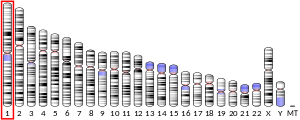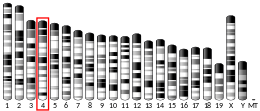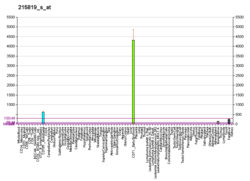RHCE (gene)
Blood group Rh(CE) polypeptide is a protein that in humans is encoded by the RHCE gene.[5][6] RHCE has also recently been designated CD240CE (cluster of differentiation 240CE).
| RHCE | |||||||||||||||||||||||||
|---|---|---|---|---|---|---|---|---|---|---|---|---|---|---|---|---|---|---|---|---|---|---|---|---|---|
| Identifiers | |||||||||||||||||||||||||
| Aliases | RHCE, CD240CE, RH, RH30A, RHC, RHE, RHIXB, RHPI, Rh4, RhIVb(J), RhVI, RhVIII, Rh blood group CcEe antigens, RHCe(152N), RHNA | ||||||||||||||||||||||||
| External IDs | OMIM: 111700 MGI: 1202882 HomoloGene: 7918 GeneCards: RHCE | ||||||||||||||||||||||||
| |||||||||||||||||||||||||
| |||||||||||||||||||||||||
| |||||||||||||||||||||||||
| |||||||||||||||||||||||||
| Orthologs | |||||||||||||||||||||||||
| Species | Human | Mouse | |||||||||||||||||||||||
| Entrez | |||||||||||||||||||||||||
| Ensembl | |||||||||||||||||||||||||
| UniProt | |||||||||||||||||||||||||
| RefSeq (mRNA) | |||||||||||||||||||||||||
| RefSeq (protein) | |||||||||||||||||||||||||
| Location (UCSC) | Chr 1: 25.36 – 25.43 Mb | Chr 4: 134.86 – 134.9 Mb | |||||||||||||||||||||||
| PubMed search | [3] | [4] | |||||||||||||||||||||||
| Wikidata | |||||||||||||||||||||||||
| |||||||||||||||||||||||||
The Rh blood group system is the second most clinically significant of the blood groups, second only to ABO. It is also the most polymorphic of the blood groups, with variations due to deletions, gene conversions, and missense mutations. The Rh blood group includes this gene which encodes both the RhC and RhE antigens on a single polypeptide and a second gene which encodes the RhD protein. The classification of Rh-positive and Rh-negative individuals is determined by the presence or absence of the highly immunogenic RhD protein on the surface of erythrocytes. Alternative splicing of this gene results in four transcript variants encoding four different isoforms.[6]
A recent study in the population of the island of Sardinia shows the association of a noncoding variant in the RHCE gene (rs630337) with an increased erythrocyte sedimentation rate(ESR). This suggest a possible causal effect of this polymorphism on this inflammatory marker despite not found in coding region of the gene.[7]
References
- GRCh38: Ensembl release 89: ENSG00000188672 - Ensembl, May 2017
- GRCm38: Ensembl release 89: ENSMUSG00000028825 - Ensembl, May 2017
- "Human PubMed Reference:". National Center for Biotechnology Information, U.S. National Library of Medicine.
- "Mouse PubMed Reference:". National Center for Biotechnology Information, U.S. National Library of Medicine.
- Mouro I, Colin Y, Cherif-Zahar B, Cartron JP, Le Van Kim C (Dec 1993). "Molecular genetic basis of the human Rhesus blood group system". Nat Genet. 5 (1): 62–5. doi:10.1038/ng0993-62. PMID 8220426.
- "Entrez Gene: RHCE Rh blood group, CcEe antigens".
- Sidore C; et al. (2015). "Genome sequencing elucidates Sardinian genetic architecture and augments association analyses for lipid and blood inflammatory markers". Nature Genetics. 47: 1272–1281. doi:10.1038/ng.3368. PMC 4627508. PMID 26366554.
Further reading
- Agre P, Cartron JP (1991). "Molecular biology of the Rh antigens". Blood. 78 (3): 551–63. PMID 1907207.
- Avent ND, Reid ME (2000). "The Rh blood group system: a review". Blood. 95 (2): 375–87. doi:10.1182/blood.V95.2.375. PMID 10627438.
- Flegel WA, Wagner FF (2000). "Molecular genetics of RH". Vox Sang. 78. Suppl 2: 109–15. PMID 10938938.
- Wagner FF, Flegel WA (2004). "Review: the molecular basis of the Rh blood group phenotypes". Immunohematology / American Red Cross. 20 (1): 23–36. PMID 15373666.
- Callebaut I, Dulin F, Bertrand O, et al. (2006). "Hydrophobic cluster analysis and modeling of the human Rh protein three-dimensional structures". Transfusion clinique et biologique : journal de la Société française de transfusion sanguine. 13 (1–2): 70–84. doi:10.1016/j.tracli.2006.02.001. PMID 16584906.
- Le Van Kim C, Chérif-Zahar B, Raynal V, et al. (1992). "Multiple Rh messenger RNA isoforms are produced by alternative splicing". Blood. 80 (4): 1074–8. PMID 1379850.
- Le van Kim C, Mouro I, Chérif-Zahar B, et al. (1992). "Molecular cloning and primary structure of the human blood group RhD polypeptide". Proc. Natl. Acad. Sci. U.S.A. 89 (22): 10925–9. doi:10.1073/pnas.89.22.10925. PMC 50455. PMID 1438298.
- Chérif-Zahar B, Bloy C, Le Van Kim C, et al. (1990). "Molecular cloning and protein structure of a human blood group Rh polypeptide". Proc. Natl. Acad. Sci. U.S.A. 87 (16): 6243–7. doi:10.1073/pnas.87.16.6243. PMC 54509. PMID 1696722.
- Suyama K, Goldstein J, Aebersold R, Kent S (1991). "Regarding the size of Rh proteins". Blood. 77 (2): 411. PMID 1898705.
- Chérif-Zahar B, Mattéi MG, Le Van Kim C, et al. (1991). "Localization of the human Rh blood group gene structure to chromosome region 1p34.3-1p36.1 by in situ hybridization". Hum. Genet. 86 (4): 398–400. doi:10.1007/BF00201843. PMID 1900257.
- Sawamura D, Li KH, Nomura K, et al. (1991). "Bullous pemphigoid antigen: cDNA cloning, cellular expression, and evidence for polymorphism of the human gene". J. Invest. Dermatol. 96 (6): 908–15. doi:10.1111/1523-1747.ep12475433. PMID 2045679.
- Avent ND, Ridgwell K, Tanner MJ, Anstee DJ (1990). "cDNA cloning of a 30 kDa erythrocyte membrane protein associated with Rh (Rhesus)-blood-group-antigen expression". Biochem. J. 271 (3): 821–5. PMC 1149638. PMID 2123099.
- Bloy C, Blanchard D, Dahr W, et al. (1988). "Determination of the N-terminal sequence of human red cell Rh(D) polypeptide and demonstration that the Rh(D), (c), and (E) antigens are carried by distinct polypeptide chains". Blood. 72 (2): 661–6. PMID 3135863.
- Avent ND, Ridgwell K, Mawby WJ, et al. (1989). "Protein-sequence studies on Rh-related polypeptides suggest the presence of at least two groups of proteins which associate in the human red-cell membrane". Biochem. J. 256 (3): 1043–6. doi:10.1042/bj2561043. PMC 1135522. PMID 3146980.
- Kajii E, Umenishi F, Iwamoto S, Ikemoto S (1993). "Isolation of a new cDNA clone encoding an Rh polypeptide associated with the Rh blood group system". Hum. Genet. 91 (2): 157–62. doi:10.1007/BF00222717. PMID 7916743.
- Chérif-Zahar B, Le Van Kim C, Rouillac C, et al. (1994). "Organization of the gene (RHCE) encoding the human blood group RhCcEe antigens and characterization of the promoter region". Genomics. 19 (1): 68–74. doi:10.1006/geno.1994.1014. PMID 8188244.
- Huang CH, Chen Y, Reid M, Ghosh S (1996). "Genetic recombination at the human RH locus: a family study of the red-cell Evans phenotype reveals a transfer of exons 2-6 from the RHD to the RHCE gene". Am. J. Hum. Genet. 59 (4): 825–33. PMC 1914783. PMID 8808597.
- Huang CH (1996). "Alteration of RH gene structure and expression in human dCCee and DCW-red blood cells: phenotypic homozygosity versus genotypic heterozygosity". Blood. 88 (6): 2326–33. PMID 8822955.
External links
- RHCE+protein,+human at the US National Library of Medicine Medical Subject Headings (MeSH)
This article incorporates text from the United States National Library of Medicine, which is in the public domain.






